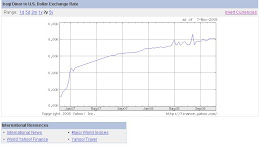By Erik De Vrijer, Udo Kock, and David Grigorian
IMF Middle East and Central Asia Department
February 13, 2008
* Despite difficult conditions, Iraq has made progress toward stabilizing the economy
* Under new IMF program, focus is on increased investment and output in oil sector
* Iraq's economic outlook hinges on improved security
Although the very high level of violence abated in 2007, Iraq continues to experience a difficult security situation in parts of the country.
Yet the country made significant progress under an IMF Stand-By Arrangement, which was approved in December 2005. The IMF's Executive Board approved on December 19, 2007, a new Stand-By Arrangement for Iraq. In light of Iraq's strong international reserves position, the authorities will treat the new arrangement as precautionary, which means that they do not intend to draw these resources. The decision to continue supporting Iraq's economy recognizes the significant progress the country made under the first program
But the IMF noted that much remains to be done to put Iraq on a path to sustainable growth. The main objectives of the new program, which will run through March 2009, are to maintain macroeconomic stability, facilitate higher investment and output in the oil sector, and advance structural reforms and institution building.
Progress under first program
Inflation, which spiked at 65 percent at end-2006, was sharply reduced with a policy package that included exchange rate appreciation, monetary tightening, and fiscal discipline. These policies, together with measures to reduce fuel shortages that resulted in declining black market fuel prices, limited the increase in consumer prices to less than 5 percent during 2007. Core inflation, which excludes fuel and transportation prices, fell to about 12 percent from 32 percent in 2006.
Because of the security conditions, however, the implementation of the public investment program fell short of budget plans, and oil output and economic activity in general did not expand as much as was hoped. Before oil exports through the northern pipeline to Turkey resumed in the last quarter of 2007, oil production hovered around 2 million barrels per day (mbpd) (see Chart 1).



The shortfall in oil production was offset by higher world market prices (see Chart 2). Iraq's international reserves position has continued to strengthen, allowing the country to repay in advance the full amount outstanding from a 2004 loan under the IMF's Emergency Post-Conflict Assistance (EPCA), which preceded the first Stand-By Arrangement.

Aside from improving macroeconomic stability, Iraq also made progress on structural reforms. The authorities significantly increased the initially very low domestic official fuel prices to levels that are in line with those in the region's other oil-exporting countries. Direct subsidies on fuel products, which amounted to almost 13 percent of GDP in 2004, were eliminated in 2007, except for a small subsidy on kerosene. This has released much-needed resources for reconstruction and reduced the incentives for smuggling fuel products out of the country. Other achievements include amending the new pension law to make the pension system fiscally sustainable and modernizing the payments system.
Aiming for stability
Maintaining macroeconomic stability remains a key objective of the authorities' program for 2008. The Central Bank of Iraq will gear its monetary and exchange rate policies toward achieving this objective. Fiscal policy will help contain inflation by keeping current spending, notably the wage and pension bill, in check to limit pressure on Iraq's small non-oil economy. The envisaged increase in government investment, in view of its high import content, should have only a limited impact on inflation.
In light of Iraq's large reconstruction needs, the government has prepared an ambitious investment program for 2008. It is taking steps to speed up projects that could not be undertaken in previous years, in particular to rebuild infrastructure and improve the provision of electricity, water and sanitation, education, and health care. Provided that further security improvements allow execution of the public investment program and a return to a more normal functioning of the economy, economic activity outside the oil sector should pick up.
The authorities' program will also focus on the oil sector and the need for higher investment to raise output and for greater transparency. Raising oil production will be crucial to provide the resources needed for reconstruction over the medium term. Projects to increase production and export capacity in the south and better protect the northern export pipeline are either under way or planned. With continued exports through the north, oil production is projected to increase to 2.2 mbpd in 2008, helping to boost economic growth overall to about 7 percent.
Following the installation of a metering system in the Basra export terminal, metering systems in other ports and oil installations are also being put in place. During 2008, an all-Iraqi Committee of Financial Experts will prepare to take over the audit oversight role of the Development Fund for Iraq, through which all oil revenues are channeled, from the International Advisory and Monitoring Board, which has performed this role since December 2003.
Under the new program, restructuring Iraq's banking sector will be a major challenge. The sector is dominated by state-owned commercial banks, which account for 90 percent of the banking sector's total assets (70 percent for Rafidain and Rasheed banks alone). The banks lack expertise in commercial banking and market finance. There is very little extension of credit to the private sector, and the banks' asset composition is heavily tilted toward government securities.
Compared with other banks in the region, Iraqi banks' deposit base and loan portfolio are small. Most banks lack the expertise to assess risks and, thus, few offer loans with maturities of more than one year. As a result, financial intermediation is weak (see Chart 3). Banks' total loan portfolio at end-2006 was only $2.2 billion (4 percent of GDP), mostly in the form of overdrafts. Total deposits stood at $12.9 billion (26 percent of GDP).

Under the program, financial and operational audits of the two largest banks will be undertaken and a restructuring program adopted, with IMF and World Bank technical assistance. Other structural reforms include modernizing public financial management and strengthening the accounting and reporting framework of the Central Bank of Iraq.
Outlook hinges on security
Iraq's medium-term outlook is favorable, provided security continues to improve. The sustainability of its external debt situation would, however, still require the third and final tranche of Paris Club debt rescheduling (worth 20 percent in net present value terms) planned for end-2008 and further progress in reaching debt reduction agreements with Iraq's other creditors. Disbursement of the last Paris Club tranche is contingent on good performance under the new Stand-By Arrangement.
Although much remains to be done, Iraq has registered a number of successes. Significant progress was made in stabilizing the macroeconomic environment and in advancing the structural reform agenda. The 2008 program will focus on similar objectives to capitalize on the momentum achieved by the first program and, in particular, to help the economy begin growing again. Continued progress, however, will depend on the success of efforts to stabilize the security situation and strengthen the political consensus.

